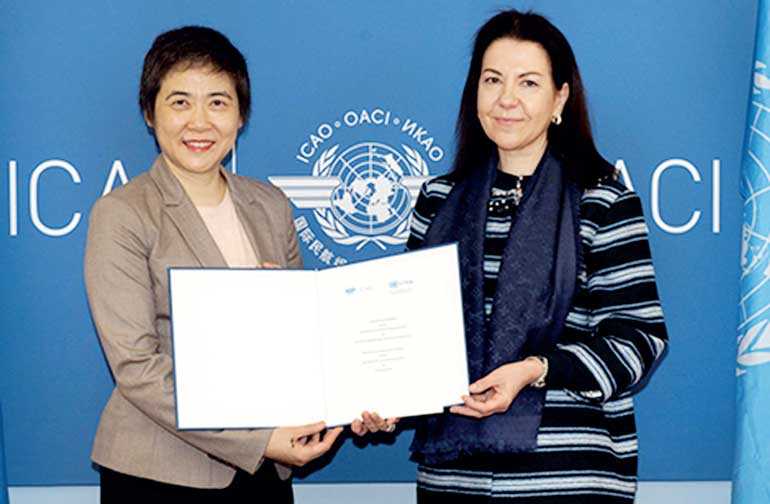Sunday Feb 22, 2026
Sunday Feb 22, 2026
Monday, 21 May 2018 00:00 - - {{hitsCtrl.values.hits}}

ICAO Secretary General Dr. Fang Liu (left) and the Assistant Secretary-General and Executive Director of the Counter-Terrorism Executive Directorate, (UN CTED) Michèle Coninsx (right), took an important step today to address international terrorist threats when they signed a new agreement which will greatly enhance their agencies’ cooperation and information sharing relating to border controls, aviation security and counter-terrorism response consistent with a wide range of UN Security Council resolutions
ICAO Secretary General Dr. Fang Liu and the Assistant Secretary-General and Executive Director of the Counter-Terrorism Executive Directorate (UN CTED), Michèle Coninsx, last week took an important step to address international terrorist threats.
The two leaders met in Montréal to sign a new agreement which will now greatly strengthen and enhance their agencies’ cooperation and information sharing relating to border controls, aviation security and counter-terrorism, and which will support key United Nations Security Council resolutions regarding international priorities for aligned counter-terrorism response.
“This new agreement directly supports UN Security Council resolution 2309 and aligns with the ICAO Global Aviation Security Plan (GASeP). It enables us to cooperate to mobilise political will, to leverage expertise, optimise resources and maximise deliverables to Member States,” explained ICAO Secretary General Liu. “Together we will pursue to strengthen Member States’ capacity and promote a more widespread culture of collective responsibility and effective, collaborative responses to international terrorist threats, while at the same time continuing to simplify and streamline travel clearances for our network’s vast majority of legitimate low risk passengers.”
“Cooperation with ICAO is vital to the work of the Counter-Terrorism Committee (UN CTC) and UN CTED. This new agreement not only supports UN Security Council Resolution 2309, but also efficiently addresses others including UNSC resolutions 2341, 2395 and 2396. CTC visits are becoming more complex and, in some cases, more focused on certain thematic areas. As a result, they increasingly require specialised expertise, including in the area of civil aviation,” noted Coninsx.
“UN CTED will therefore continue to rely on ICAO’s support in conducting assessment visits on the Committee’s behalf. The CTC and CTED will continue to support the work of ICAO in coherence with the UN Office of Counter-Terrorism (OCT) and UN Global Counter-Terrorism Coordination Compact and promote the implementation of its Standards and Recommended Practices, whether in the Security Council or in our interaction with regional and sub-regional organisations and Member States.”
The new ICAO-UN CTED agreement will be followed by a joint action plan and build upon past cooperation initiatives between the two UN entities, mainly being pursued at present under the aegis of the UN Counter-Terrorism Committee (UN CTC) and through the development of an Advanced Passenger Information (API) programme for global aviation, CTC State assessment visits.
ICAO’s Global Aviation Security Plan (GASeP), developed and issued at the end of 2017, has already begun to assist this process and its objectives will now be bolstered by the new cooperation parameters being set out. “This new agreement will greatly assist our agencies’ efforts to respond in a coordinated way to new and emerging challenges, such as evolving security requirements and increased international mobility,” concluded Dr. Liu. “It also recognises our shared emphasis on prioritising more sustainable travel facilitation solutions, including travel document security, citizen identity management, and the international standardisation of passenger data exchange.”